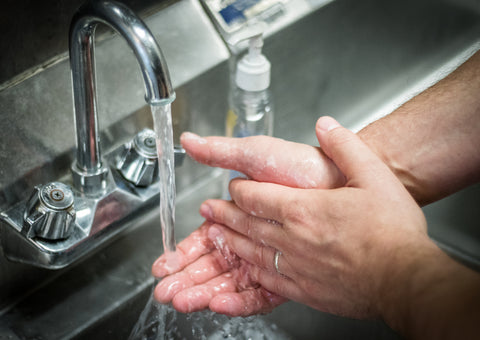Staphylococcus aureus, more commonly known as staph, is a bacterial infection that can affect anyone but especially athletes. A staph infection in a hockey player is quite common due to the nature of the sport.
This bacterial infection can cause many symptoms, such as boils, rash, and cellulitis. More severe or untreated staph infections may also cause staphylococcal scalded skin syndrome. Symptoms of this include fever, rash, and blisters.
This bacterial infection is painful to deal with and can sometimes be resistant to treatment. Although there are ways to cure staph infection, prevention is the key here.
Prevention Starts with Having the Right Resources

Staph infection is more common than you might think. A 2016 study from the CDC looked at prevalence rates in the general population. [1]
- One in three people (about 33%) carried some form of staph infection without showing any signs of the illness.
- About 2% of people carry a variation of the infection known as MRSA (Methicillin-resistant Staphylococcus aureus), which is especially dangerous.
Athletes may be underprepared to handle injuries and the resulting staph infection due to a lack of education and resources.
- The researcher noted that only 87.1% of women and 65.3% of men reported routinely washing their hands after using the bathroom. MRSA risk can be significantly reduced with hand washing.
- The researcher also stated that having a certified athletic trainer on staff is essential for athlete wellness. Trainers assist with treating injuries and educating athletes on rehabilitation.
- The researcher states that education on staph infection is also essential for athletes to prevent staph infection. This is especially important if no athletic trainer is available.
Tips for Preventing Staph Infection

Staph infections are somewhat common but very easy to prevent. When it comes to avoiding staph infections, you need to be responsible for yourself. First, if you are aware of anyone that you know who has a staph infection, you need to stay away from that person. Staph infections are highly contagious and can spread even through the smallest amount of contact.
With athletes, such as hockey players, avoiding contact is a little more difficult because of the confined locker room space and the sport's physical nature.
In the case that you do have a staph infection, do not come into contact with anyone until it clears up. This includes staying away from games and practice. Even without direct skin to skin contact, the bacteria can live on surfaces for a brief time and spread through indirect contact.
With that said, you won't always know about the presence of a staph infection. It could be present on surfaces without anyone knowing. Your teammate may also not be aware or disclose that they have a staph infection. You should always be mindful of it and protect yourself from it just in case you do come in contact.
There are several ways to prevent a staph infection. Each of them is a simple method relating to basic hygiene and health maintenance steps that you probably already do. [2] Some other staph infection prevention methods include:
- Wash your hands frequently with soap and water or an alcohol-based hand sanitizer. At a minimum, you should wash your hands before and after playing or using shared equipment.
- Shower immediately after a game or practice.
- Wash your uniform and all pieces of clothing after each use. Make sure the clothes are completely dry before wearing them again.
- Wear clothing and gear to protect against skin abrasions or cuts.
- Cover any wound with a clean, dry bandage or other dressing as recommended by a healthcare professional. Keep the wound covered until it heals. Follow instructions for changing dressings and cleaning wounds.
- Do not share personal items that come into direct contact with the skin. These include, but are not limited to, towels, razors, bar soaps, ointments in an open container, etc.
- Make sure you have a barrier between yourself and shared equipment, such as clothing or a towel.
Staph Infection is Highly Prevalent and Contagious

Staph infection can spread in many different ways, so prevention is critical. One study looked at 62 collegiate athletes using protective athletic mouthguards (PAM's).
Researchers received 81 PAM's from the athletes, which they examined for the presence of microbes. Researchers also soaked one group of PAM's in an anti-microbial solution between uses to determine its efficacy in eliminating the microbes. [3]
- The microbial analysis revealed 154 types of gram-positive cocci (bacterial pathogens). The most common of these was staphylococcus.
- Soaking in the anti-microbial solution significantly reduced the number of microbes present on the PAM’s.
Conclusion
Staphylococcus aureus, or a staph infection, is common among athletes and in other activities of everyday life as well. Though staph infection can sometimes be treated, this isn't always a guarantee. Some types of staph infections, such as MRSA, can be tough to cure.
Taking steps to prevent staph infection is one of the best ways to protect yourself as a hockey player. Limiting contact with people who have staph infections or staying away from others when you know you have a staph infection is necessary.
Also remember to follow personal hygiene practices, not share equipment, and have injuries appropriately treated by a certified athletic trainer.
Be sure to look into natural remedies to boost your immune system as well. Ingredients such as vitamin C, magnesium, and potassium can go a long way in improving your resistance against bacteria such as staphylococcus.
Order Your Anti-Viral Program Today!
Our Anti-Viral Program package provides three high-quality supplements that can boost your immune health and help you fight off staph infections; The One, Humic Acid, and Noble Servant.
These supplements include ingredients such as fermented vitamin C concentrate, magnesium, potassium, and more are designed to help ensure that you stay healthy and free of staph infections.
The ingredients in these supplements also will promote a healthy immune system and help fight off pathogens. This trio of supplements is the perfect bundle to promote good overall health.


